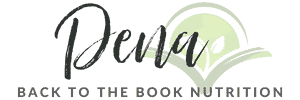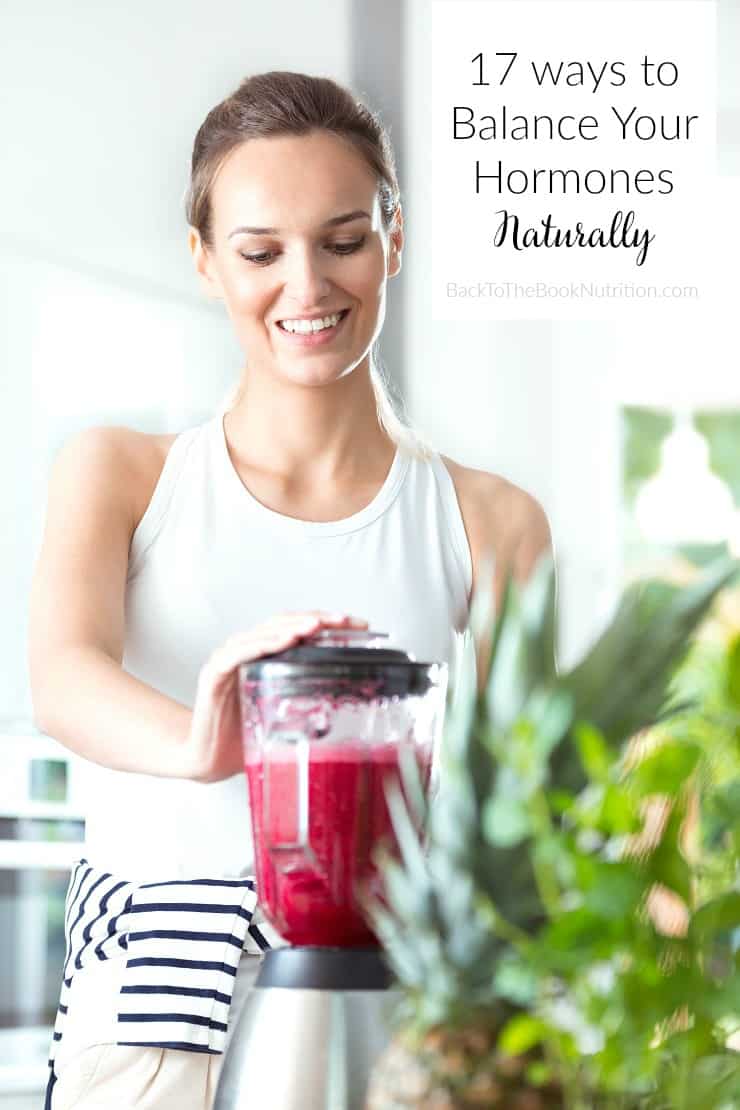Say farewell to PMS, irregular periods, headaches, and more with these 17 tips to balance your hormones naturally! Includes recommendations for foods, supplements, exercise, stress management, gut health, and more.
Hormone imbalance is becoming more prevalent and it can happen for a variety of reasons. If you have irregular periods or other symptoms of hormone imbalance, these basic steps will provide a solid foundation to help restore hormone balance and promote healthy, normal periods.
17 Ways to Balance Your Hormones Naturally
1. Eat Real Food
There are so many diets to choose from out there, many of them extreme in their avoidance of foods or food groups. While restrictive diets are necessary in some cases, the majority of us would see great improvements in multiple areas of our health – including our hormone health – if we just took the first step of eating mostly real, whole foods and cutting back on processed junk.
What to Eat:
- Mostly plants – these should make up 50% of your plate (vegetables, fruits, beans, legumes, nuts, avocados, virgin olive and coconut oil, etc.)
- Carefully sourced animal foods – these should make up 25-50% of your plate (wild caught fish/seafood, grass fed meats and eggs, organic dairy – I prefer raw, traditional cooking fats)
- Select, minimally processed foods (optional) – these should make up no more than 25% of your plate (rice, whole grains, healthier convenience foods)
- Balance, balance, balance – healthy hormone production requires carbs, fat, and protein, so eat a reasonable mix of all of them
- Occasional treats – Most of us can indulge a little here and there, just make sure you’re keeping it in check.
2. Eat Cruciferous Vegetables Daily
Cruciferous vegetables – sometimes called Brassica vegetables – are high in fiber as well as multiple natural compounds like sulforafane, indole-3-carbinol (I-3-C), and diendolylmethane (DIM), which help the body detoxify estrogen to prevent it from building up in the system which can cause “estrogen dominance.” The fiber also helps keep the bowels moving, another way the body rids itself of excess hormones.
Cruciferous vegetables include:
- Arugula
- Bok choi
- Broccoli
- Brussels sprouts
- Cabbage
- Cauliflower
- Kale
- Kohlrabi
- Mustard greens
Sulforaphane and diindolylmethane (DIM) supplements can also be very helpful in cases of significant estrogen excess (i.e., PMS, endometriosis, fibroids, etc.) and possibly even androgen excess (i.e., PCOS). Ask your provider whether these are right for you.
3. Eat Wild Caught Fish/Seafood
We all know that wild caught salmon and other fish and seafood are preferred sources of omega-3 fats in our diets. These healthy fats help lower inflammation, which can help reduce cramps. Fish and seafood also provide iodine, which helps to both detoxify (reduce) estrogen in those with PMS, endometriosis, fibroids, estrogen dominance, etc., can reduce cramps and breast pain, and can help promote ovulation in women with PCOS, infertility, and other conditions related to inconsistent or nonexistent ovulation (Source).
I advise at least 2 servings of fish/seafood per week (4-6 oz each). Whether you buy fresh, frozen, or canned, just get it in! Remember, fish/seafood you get at restaurants is almost certainly farm raised – so that doesn’t count toward your weekly wild caught goal.
If you just can’t consistently eat enough wild caught fish/seafood, consider taking a high quality fish oil or cod liver oil supplement. Discuss iodine supplementation with your provider before taking since there are some cases when it might be discouraged.
Pictured: Best Slow Cooker Beef Roast
4. Eat Red Meat
Red meat sometimes gets a bad rap but, high quality meats from local farmers who raise animals on pasture are actually a gold mine of nutrition. Pasture raised red meat is an excellent source of iron, zinc, and B vitamins – all nutrients that are important for hormone health.
If you have heavy bleeding, thinning hair, sluggish thyroid, fatigue, PMS, or digestive issues, make sure you’re getting a couple of servings -(4-6 oz each) of high quality red meat weekly. Slow cooker beef roast and pulled pork are great options!
Note that iron overload has been linked to endometriosis. Having your ferritin levels checked is a good way to rule out iron overload and help determine how much iron rich high quality red meat you should eat. Your doctor can order ferritin, or you can order it yourself for around $40 from companies like Ulta Labs..
5. Ditch the Dairy?
Personally, I’m a big fan of dairy in just about any form – butter, yogurt, cheese, milk, and – yes – even the occasional whipped cream and ice cream.
But, if you’re dealing with PMS, heavy periods, acne, or other signs of excess estrogen, the extra hormones coming from dairy in your diet (even organic dairy – remember it’s still breast milk!) could be adding insult to injury. Research has shown mixed results (some studies suggest dairy could increase estrogen, while others show it can lower it).
The see whether dairy is affecting your hormones, try omitting dairy for 3 months to monitor what affects it has on your cycle.
6. To Drink or Not to Drink?
There is a bit of controversy in the scientific literature about whether alcohol is beneficial or detrimental for hormone health. On the one hand, we know that the resveratrol in red wine (but not in white) can help lower testosterone and boost estrogen levels in women with PCOS. For those who don’t enjoy red wine, taking 1,500 mg of a resveratrol supplement daily can have similar results.
Red wine may help lower estrogen in some cases too. One small clinical trial showed that daily red wine consumption for one month helped lower estrogen levels in women. White wine didn’t cause the same effect.
On the flip side, earlier studies clearly link alcohol consumption to higher estrogen levels and higher rates of breast cancer.
My general recommendation is to limit alcohol to no more than 1-2 drinks per week, with a preference for red wine over other forms.
7. Take Magnesium
Mangesium helps with muscle relaxation, which can improve muscle cramps, sleep, headaches, and period pain.
Most of us don’t get enough magnesium in our diets – both because we skimp on high magnesium foods, and because of mineral depletion of our soils and other environmental factors out of our control. I usually encourage both eating higher magensium foods and supplementing.
Food Sources of Magnesium:
- Brown rice
- Spinach
- Almonds
- Swiss chard
- Lima beans
- Peanuts
My Favorite Magnesium Supplement:
- Magnesium Glycinate – a highly absorbable form with 100mg per capsule for easy dosing (I usually recommend 200-600 mg in the evening)
8. Break up with Plastic (& other Endocrine Disruptors)
Plastics and plastic-like products have estrogen-like effects in our bodies. This isn’t just limited to BPA. It includes dioxins, phthalates, lead, and many others that are found nearly everywhere these days – clothing, makeup and personal care products, building materials, and even our water supply!
Download the free list of all my favorite clean beauty + household products here!
EWG has also compiled a “Dirty Dozen” list of the most harmful endocrine disruptors and how to avoid them.
9. Manage Your Stress
It is nearly impossible to live under chronic stress without suffering some degree of hormone imbalance. Our bodies were designed to prioritize responding to stressful events over things like reproduction. This is wonderful if you’re being chased by a lion but can be problematic if your body perceives your fast paced, high pressure, technology-saturated daily life as a source of constant stress and ends up perpetually stealing resources from your hormone production efforts.
Stress depletes key nutrients for hormone balance (magnesium, B vitamins, etc.), but also disrupts signaling between your HPA stress axis and your ovaries, resulting in low progesterone and, in some more entrenches cases, lower estrogen as well.
Common Sources of Stress:
- Emotionally stressful situations, whether acute or chronic
- Big life events, whether positive or negative (weddings, deaths, job changes, etc.)
- Disrupted sleep
- Poor blood sugar control
- Excessive exercise
- Physical injury or illness
- Food intolerances
- Dysbiosis (imbalance of gut bacteria)
- Toxins
- Autoimmune conditions
Download my free 3-step stress management guide here.
10. Balance Your Blood Sugar
Monthly hormonal shifts can affect our blood sugar, which can make us more moody and increase cravings. In turn, chronically low or high blood sugars can lead to hormone imbalance. In fact, some hormone related conditions like PCOS are strongly linked to blood sugar imbalance and insulin resistance.
How to balance your blood sugar:
- Eat real food
- Don’t eat too much
- Limit sweets, sugary drinks, and refined foods
- Be active
- Manage your stress
When these steps aren’t enough, additional monitoring with labs and/or continuous glucose monitor (CGM) can be helpful to identify specific trouble spots. Supplements to help control blood sugar (i.e., chromium, myo-inositol, etc.) may be beneficial for some.
11. Get Great Sleep
Sleep makes everything better, and hormone health is no exception. When our bodies are chronically sleep deprived (less than 7 hours per night every night, or less than 6 hours per night many nights), our stress hormones surge and our reproductive hormones suffer. I recommend at least 8 hours of uninterrupted sleep per night with at least one morning per week where you sleep in until you wake naturally without an alarm.
Get my favorite sleep tips + supplements here!
12. Exercise, But Not Too Much
Our bodies were designed to move and research shows that physically active individuals have better energy levels, mood, sleep, weight, hormone balance, gut health, and more! So pick an activity you enjoy and get moving.
Just remember that too much exercise is actually a significant stress on the body. Choose exercises you enjoy and do them at an intensity that challenges you, but doesn’t completely exhaust you. If it takes more than 30-60 minutes to recover your energy after a work out, you may be overdoing it.
If you’re dealing with HPA-axis dysfunction (aka: adrenal fatigue), chronic fatigue syndrome, or similar conditions, gentle exercises like stretching and short walks may be best until your health is restored.
Note: This post contains affiliate links. By making purchases through these links, you pay the same amount for products, but a small portion of the sale will be sent my way to help support the mission of Back To The Book Nutrition. Thank you!
13. Love Your Liver
The liver is the primary organ responsible for detoxifying the body. This includes everything from alcohol to medications to harmful chemicals to hormones. There are two main phases of liver detox: Phase I, where substances are essentially packaged for processing (imagine a company packaging up their product for shipping); and Phase II, where they are actually processed and ready for removal (now those packaged products are being loaded onto the truck for shipping).
How to support liver function:
- Follow healthy eating guidelines outlined above
- Eat cruciferous vegetables daily as mentioned above
- Incorporate fresh herbs like cilantro, parsley, and others into your cooking often
- Use fresh garlic and turmeric in cooking whenever possible
- Drink filtered water (we use the under sink mounted Watt’s Premier 4 stage Reverse Osmosis filter at our house)
- Replace plastic and other hormone disrupting chemicals in food storage, personal care, and household products as outlined above
- Discuss liver supportive supplements like milk thistle and others with your provider
- Discuss liver/gallbladder flushes and/or coffee enemas with your provider
14. Fix Your Gut
Continuing the shipping analogy used for the liver’s role in detoxification, the gut acts as the shipping truck that actually delivers the “packages” out of the body. For this reason, the elimination via the gut has recently been called “Phase III Detox”.
So it makes sense that, when stool stalls out in the gut, some of those hormone byproducts that have been packaged for removal can be re-absorbed and sent back into circulation, increasing hormone levels. This is why it’s critical that you keep your bowels moving and avoid chronic constipation at all costs!
Imbalances of “good” and “bad” bacteria in the gut can also disrupt hormone balance. For example, high levels of “bad” bacteria in the gut can increase beta-glucuronidase, which reactivates estrogen byproducts and makes them more easily re-absorbed back into circulation. The result is higher estrogen levels and signs of estrogen excess like PMS, cramps, headaches, heavy menstrual flow, endometriosis, and fibroids.
If you have gut symptoms like heartburn, bloating, gas, pain, constipation, loose or urgent stools, floating stools, or other GI symptoms, it may be helpful to get a comprehensive stool test to find out what underlying gut issues could be fueling your hormone imbalance.
Schedule a free, 10 minute Discovery Call to learn more about stool testing and my Holistic Nutrition Coaching Services!
15. Leverage Your Supplements
These are some of my favorite supplements for women’s health in general, and period healthy specifically. Not everyone needs these, but they can be very helpful in many cases of hormone imbalance and irregular periods. Discuss with your provider before taking.
Foundational Supplements that are Great for Most Women:
- High quality multivitamin to provide basic micronutrient support
- Magnesium glycinate to correct deficiencies and to help with cramps, headaches, and sleep
- High quality fish oil or cod liver oil to help reduce inflammation
- Fat soluble vitamins A,D,E, and K2 to support hormone balance, immune function, and gut health
May Be Additionally Beneficial for Women with Hormone Imbalance:
Do not add these without first consulting with your practitioner – these are targeted toward specific imbalances but could make symptoms worse if they’re not the right fit for you!
- Iron to combat blood losses related to heavy menstrual bleeding
- Zinc to help support ovulation
- Iodine to help reduce estrogen excess and ovarian cysts, and to help support ovulation (must take selenium with it; caution if you have autoimmune thyroid disease)
- B6 to combat symptoms of PMS
- Licorice to help control high testosterone/androgen levels
- Chaste Tree to promote ovulation
- Diindolylmethane (DIM) to reduce excess estrogens and androgens
- Chromium to help control blood sugar
- Myo-inositol to help control blood sugar
- Maca and other adaptogens to help promote hormone balance
16. Track Your Cycles
Of course, I always advocate for tracking your basal body temperatures and other factors like cervical mucus to help you identify any specific hormonal imbalances. Work with a holistic practitioner like myself to help you interpret your monthly cycle patterns.
Note that if you’re on hormonal birth control, there’s no need to track your menstrual cycles.
17. Avoid Hormonal Birth Control (& Other Hormone Disrupting Medications)
Hormonal birth control – especially the pill – is conventional medicine’s answer to almost any type of hormone imbalance. But it’s important to know that hormonal birth control does NOT balance hormones. It suppresses them.
This may be an effective way to quiet the symptoms of hormone imbalance, but definitely isn’t a real solution to the root cause. In fact, taking birth control can make hormone imbalance worse in the long run. It also increases risk for depression, gut dysfunction, nutrient deficiencies, and some cancers.
With rare exception, I advise steering clear of hormonal birth control altogether if possible. Other medications like corticosteroids and statins can also interfere with hormone production and/or balance, so be sure to discuss those concerns with your prescribing physician if you are taking or considering taking those medications.
The Bottom Line for Natural Hormone Balance
The big take-away here is eat real food, be active, slow down, get good sleep, and listen to your body. These are all simple concepts, but they aren’t always easy to do in today’s world. Still, to the degree to which you can consistently implement these, your hormone health and overall health will benefit.
As always, if you want a personalized plan to optimize your hormones, or are interested in functional medicine testing for hormone imbalance, I’d love to help!
Schedule your free Discovery Call now to see if we’re a good fit!
Disclaimer: Information on this site is intended only for informational purposes and is not a substitute for medical advice. Always consult with a trusted healthcare provider before implementing significant dietary change. Read additional disclaimer info here.




Can hormonal imbalance stop me from getting pregnant ?if yes, how can it be treated please?
Hi, I’m sorry I’m just now seeing your question. Yes, hormonal imbalances can prevent pregnancy. But, in most cases, there’s a lot you can do with food, supplements, and lifestyle to remedy that. The tips in this post are a great foundation but, if you have a specific hormone imbalance, you’ll want a good medical team as well as a dietitian or holistic practitioner who is familiar with your imbalance and can personalize the eating/supplement/lifestyle recommendations to get you the best results. Feel free to schedule a Discovery Call with me if you’d like to talk through that some more… Read more »
This is a superb post. Though I am fortunate enough to not experience irregular periods. These are the things which I do – but never talk about or even know that they remotely help to have a regular cycle! It’s great to have it all in one place! Thanks for the post!
I am glad you found it useful!
I actually have regular schedule periods except when I am sick. Then it takes a break.
Very interesting. Hormones are so sensitive to stress and illness, so I can see how that might happen.
As I age, hormone balance is an important topic that’s on my mind. I think diet and exercise play a huge role in keeping us healthy.
Very true Elle!
Thanks for this informative tips and ideas with us. I am sharing with my partner hope this will going to help her.
I hope it does help Sundeep. If your partner needs any further help I give free 10 min calls scheduled here.
This was really informative for us. Great tips. I would like to follow all these tips. Thanks for sharing.
I had problems for years, but have done all except for two of these (getting good sleep and avoid dairy) and it was life-changing. I have now been doing these things for years and am in my 50’s and perfectly healthy with no more cycle/hormone issues. I got my blood pressure taken this week and the dental assistant said the numbers were amazing. 🙂
So good to hear Marie! Sometimes the best solutions are just plain clean and simple to implement.
Can N Acetyl Cysteine supplements help for symptoms of:
Hirsutism
Acne
Insulin Resistance
Hair loss
High androgen/testosterone levels????
I’m 21 years old and my medical doctors insist on birth control and Spironolactone and they both wrecked my hair, skin, and body. None of them recommend natural supplements or natural alternatives.
I’ve read that N Acetyl Cysteine helps with all the symptoms I have but I wanted to know if its actually legit. I just want to look beautiful and feminine again and not with acne, hair loss, hairy body and unbalanced hormones.
Hi Crystal, I’m so sorry to hear about your experience with birth control and Spironolactone. The short answer to your question is, yes – N-Acetyl-l-Cysteine (NAC) has been shown to reduce insulin levels and lower testosterone in women with PCOS (This study used 600 mg three times daily). Assuming that hirsutism, acne, and hair loss were related to the insulin and/or testosterone levels, those could improve as well. While a number of great supplements can be helpful in these situations, they’re just one piece in the puzzle. I’d urge you to consider working with a practitioner who can order comprehensive… Read more »
I’ve been so interested in how diet plays a role in this! These are such great tips!
Thanks, Lindsey!
I think while I could easily succeed as most of these steps managing my stress would be the most stressful. Isn’t that ironic. It’s something I’ve been dealing with for a very long and while it has improved it still needs work.
So true, Cia – stress management is definitely easier said than done! Keep at it!